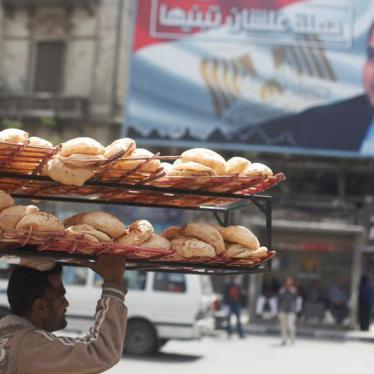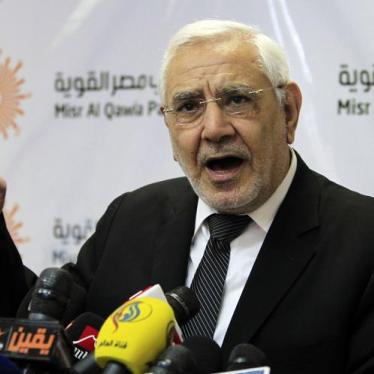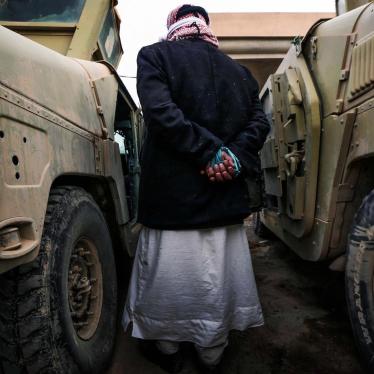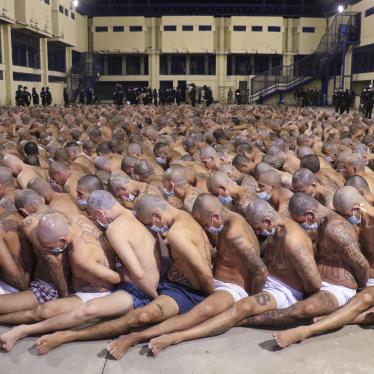(Beirut) – Egyptian authorities are increasingly using counterterrorism and state-of-emergency laws and courts to unjustly prosecute journalists, activists, and critics for their peaceful criticism, Human Rights Watch said today.
These abusive practices and distortion of counterterrorism measures have taken place at the same time as Egypt was chairing one of the key United Nations committees to ensure compliance with counterterrorism resolutions and while the UN’s most senior counterterrorism official was visiting the country.
“While Egypt faces security threats, the government of President Abdel Fattah al-Sisi has exploited these threats cynically as a cover to prosecute peaceful critics and to revive the infamous Mubarak-era state security courts,” said Nadim Houry, terrorism/counterterrorism director at Human Rights Watch. “Egypt is combining a bad law with unjust courts and the outcome has been predictably disastrous, as al-Sisi’s Western allies look the other way.”
In the period before the March 2018 presidential elections, Egyptian police and National Security Agency forces carried out a wave of arrests of critics of al-Sisi. The crackdown continued after the election with the detention of prominent activists and journalists and their prosecution under Egypt’s 2015 counterterrorism law. The law criminalizes a wide range of acts, including publishing or promoting news about terrorism if it contradicts official statements.
Some cases have been transferred to the Emergency State Security Courts, a parallel judicial system operating since October 2017, under the state of emergency that the government claims is being used only against terrorists and drug traffickers. These courts do not guarantee a fair trial and their decisions are not subject to appeal.
Human Rights Watch has documented the detention of scores of activists and journalists (see Annex) since 2015, when the new counterterrorism law was issued, who have been referred for prosecution under terrorism-related charges. In each case, the charges are apparently based on peaceful criticism or opposition to the authorities. Some of those prosecuted are affiliated with opposition parties and movements such as Strong Egypt Party and April 6 Youth Movement, while others are journalists and human rights activists.
Those recently arrested include a well-known blogger and rights defender, Wael Abbas. Security forces detained him on May 23, 2018, and kept him for almost 36 hours in an undisclosed location before taking him before prosecutors. Other recent detainees include Amal Fathy, a political activist and the wife of the head of the Egyptian Commission for Rights and Freedoms, a human rights organization, and Shady Abu Zaid, a comic known for a 2016 viral video in which he inflated condoms and handed them to security forces guarding Tahrir Square on the anniversary of the 2011 Egyptian revolution.
Authorities have referred these cases to Supreme State Security Prosecution, the branch of general prosecution that usually oversees terrorism cases. Lawyers are frequently prevented from accompanying their clients to interrogations. The prosecutors charged several activists under the counterterrorism law with “aiding a terrorist group in achieving its aims,” or “spreading false news,” or joining a “banned group” and referred them to Emergency State Security Courts.
Prosecutors indicted Abbas on claims that he was part of the “media wing of the Muslim Brotherhood,” the political group of the ousted elected President Mohamed Morsy. Several journalists and activists have been indicted in this case, case 441 of 2018, over the past weeks, including some who are actually critical of the Muslim Brotherhood.
Al-Sisi’s government, assisted by a mainstream media that Reporters Without Borders says is under increasing control of the intelligence services, has sought to portray a broad conspiracy against the security of Egypt that includes human rights and labor activists, members of the Muslim Brotherhood, journalists, and rights lawyers. In March 2018, the Interior Ministry published a video, “The Spider’s Web,” which portrayed diverse groups ranging from the Islamic State (also known as ISIS) to the Muslim Brotherhood, to human rights groups, including Human Rights Watch, as part of a plot against Egypt’s security.
Since 2013, Egypt has banned a wide range of groups as “terrorist organizations,” including the Muslim Brotherhood; April 6 Youth Movement, an activist group that played a key role in the protests organized against Mubarak in 2011; and football Ultras, hardcore fan groups. The Cairo Court for Urgent Matters, a non-specialized court, issued most of these decisions.
The reliance on the emergency courts adds to a broader legal arsenal that security forces have used in the name of fighting terrorism, including terrorism courts and expedited legal proceedings.
In March 2018, the head of the newly established UN Office of Counter-Terrorism, Under-Secretary-General Vladimir Voronkov, visited Egypt. Voronkov’s office was established in June 2017 to provide leadership in carrying out the General Assembly counterterrorism mandates. These include, as one of four “pillars” of counterterrorism strategy, “ensuring human rights and rule of law.” While the exact nature of discussions was not disclosed, no criticism was publicly voiced about Egypt’s abuse of one of the UN’s key pillars to fighting terrorism.
From January 2016 to January 2018, while Egypt was using its counterterrorism courts to silence dissent, Egypt was chair of the UN Security Council Counter-Terrorism Committee (CTC), a subsidiary body composed of all 15 Council members that monitors member states’ implementation of the various Security Council resolutions and decisions dealing with counterterrorism. Security Council resolution 1624 (2005), which addresses incitement to commit terrorist acts, stresses that countries must ensure that any measures they take to carry out the resolution comply with all their obligations under international law, in particular international human rights law.
“Egypt is proud of presenting itself as a key international actor in the fight against terrorism, but its domestic record shows that it is fighting peaceful critics and dissidents under the cover of countering ‘terrorism,’” Houry said. “And the most worrying part is that international actors in charge of ensuring an effective and human rights compliant counterterrorism strategy have been completely silent about this crackdown.”
For more information on the use of emergency courts and terrorism laws, please see below.
The Emergency State Security Courts are exceptional courts grounded in Egypt’s State of Emergency Law No. 162 of 1958. President Abdel Fattah al-Sisi declared a nationwide state of emergency in April 2017, which has been renewed and in effect ever since. Former Prime Minister Sherif Ismail issued a decree in October 2017 placing numerous crimes, including those related to protest, assembly, terrorism, and labor law, under the jurisdiction of the State Security Courts.
Egyptian authorities have not released any information on the number of people who have been referred to these courts since that time, but they have been used against large numbers of peaceful activists, including indigenous rights activists. In November 2017, authorities referred 32 indigenous-rights activists in Nubia to these courts for participating in an unlicensed protest. The activists were protesting land policies that deprive Nubian people, an ethnic minority in the south of Egypt, from returning to their original lands, from which they were displaced in the 1960s.
The government’s use of these courts violates many international standards, including article 14 of the International Covenant on Civil and Political Rights, which guarantees to every defendant the right to trial before a competent, independent, and impartial court, as well as the right to appeal and receive a judicial review of verdicts. The president has sweeping powers over these courts, as he or the prime minister, as his delegate, can appoint the judges and determine which offenses should be referred to those courts.
There is no appeal process for the courts’ decisions, and they are considered final when the president ratifies them. This is particularly problematic given that Egypt’s counterterrorism law punishes many crimes with death. Under international standards, proceedings in death penalty cases must conform to the highest standards of judicial independence, competence, and impartiality and must strictly comply with all fair trial rights. Human Rights Watch opposes the death penalty in all cases.
The UN special rapporteur on “the promotion and protection of human rights and fundamental freedoms while countering terrorism” noted following his visit to Egypt in 2009 that trials before these courts raise “concerns about the impartial and independent administration of justice and furthermore does not comply with the right to have a conviction and sentence fully reviewed by a higher court.” The current special rapporteur has identified Egypt among the 26 countries she wishes to visit during her mandate, but Egypt has not responded to her request, according to her most recent report in September 2017.
The emergency courts earned their infamous reputation during the administration of former President Hosni Mubarak. He made extensive use of the courts in prosecuting students, human rights defenders, political activists, union members, and those suspected of opposing the government during Egypt’s long spell under the state of emergency.
Despite Article 97 of the 2014 Constitution, which provides that “individuals may only be tried before their natural judge” and “extraordinary courts are forbidden,” the emergency courts have resumed their work. In August 2017 and April 2018, several lawyers filed suits challenging the constitutionality of the emergency courts before the Supreme Constitutional Court. However, the court has yet to make a decision.
Before the government reintroduced emergency courts in October 2017, Human Rights Watch documented that authorities referred peaceful activists, often rounded up in peaceful protests, to trial before “terrorism courts,” specialized chambers of the criminal courts that the government created in December 2013 to oversee terrorism cases.
Unlike emergency courts, terrorism courts are part of the criminal justice system and accordingly are bound by the procedures outlined under the country’s criminal procedural code.
The authorities set up those courts and assigned a few specific judges to them shortly after President Mohamed Morsy’s forced ouster in July 2013. The designation of specific judges was seen at the time as an attempt to circumvent judges who had recused themselves from judging certain cases that they considered politically motivated. The terrorism courts were then used to prosecute thousands of Muslim Brotherhood members and Morsy supporters in mass trials that violated due process and often ended up in death sentences.
The authorities also used these courts to prosecute activists protesting other government actions. Human Rights Watch documented that these “terrorism courts” tried and convicted scores of protesters who took to the streets in 2016 and 2017 to oppose al-Sisi’s decision to relinquish two Red Sea islands to Saudi Arabia.
In the past, the Cassation Court, Egypt’s highest appellate court, which reviews criminal court decisions, has annulled many terrorism courts’ judgments and often ordered retrial. Several Egyptian officials, including al-Sisi, have criticized what they considered “slow” judicial processes and expressed their wish for “swifter justice.”
In April 2017, the Parliament issued several amendments to expedite criminal proceedings in terrorism cases and to reduce appeal opportunities before the Cassation Court. Al-Sisi has also issued laws that allow him more control over the appointment of the head of the Cassation Court and the Supreme Administrative Court.
The reliance on the emergency courts is further marginalizing the regular judiciary, especially the Cassation Court.
In parallel to its emergency courts, Egypt maintains an overbroad legal arsenal in the name of countering terrorism. Al-Sisi issued Law 8 of 2015 for Organizing Lists of Terrorist Entities and Terrorists that allowed the prosecutor general to request designated Cairo criminal courts to add individuals or groups to “terrorism lists.” The court has seven days to consider the request. Thousands of individuals and groups have been listed without any hearing or proper due process.
In addition, al-Sisi issued a decree in October 2014 that expanded the jurisprudence of military courts. Since that time, about 15,000 civilians including hundreds of children, have been referred to military prosecutors.









